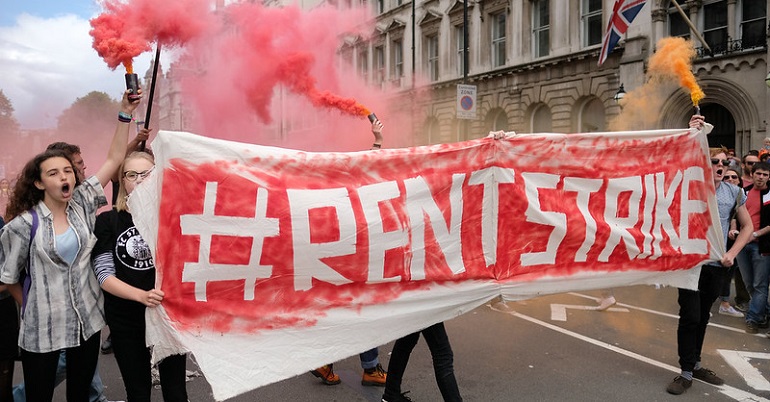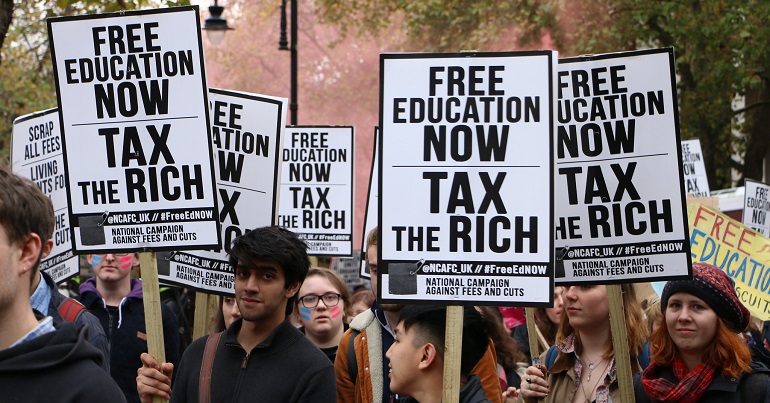Where next for the student movement in 2021?

2020 saw the UK student movement truly demonstrate its strength. Rent strikes erupted in student halls up and down the country in response to exploitative accommodation contracts. Climate activists have forced senior management to divest from the fossil fuel industry. And hundreds of students have poured onto campuses to protest against sexual violence and immutable racism that plagues the higher education sector.
Where are we now and where do we go next in 2021?
2021 will see that strength increase exponentially. The direction of the movement in 2021 is a direction of heightened radicalism and greater demands. This year will see the largest student rent strike in 40 years, an action which perfectly captures the ambition and determination of the movement.
With student union officer elections taking place this Spring, it is imperative that progressive student activists make the most of this opportunity. Filling our student unions with officers who have the skills, talent and willingness to uphold student rights in the face of continued neoliberal reforms, will only enhance student power.
As the Green Students Committee re-establish ourselves as a major player within the student movement in England and Wales, we have plans to support any Green students that wish to run for election. We are creating a handbook to train Greens to run for election as well as hosting talks with experienced Sabbatical Officers who will provide candidates with the confidence and advice needed to win.
The student and staff solidarity shown throughout this pandemic has been a shining light in an otherwise dim year. It is a relationship that the student movement must prioritise in 2021. We have seen rent strikers challenge any plans for staff redundancies as part of strike demands. We have also seen university staff speak publicly in unequivocal support for students strikers. A partnership between student and staff unions is central to achieving concessions from the government and university senior management. If 2020 has proven anything, it is that united, collective action breeds success.
What is most striking about the movement’s direction last year, and going into this one, is the evolution beyond issues that solely impact students and the education sector. The current cohort of student activists are trailblazers in the fight for climate justice. They have led conversations on racial inequality. With 50% of students becoming more political throughout the pandemic, it was inevitable that the movement’s goal matured into achieving a just society – not just an equitable higher education system.
But this evolution does not come as a surprise. History highlights that this is the continuation in the long lineage of the student movement. The student movement is brimming with historical campaigns that move away from solely focus on issues facing students as students. Resistance to the Vietnam War, organising for civil rights and the fightback against austerity all had a core base within the student movement.
What should we be demanding?
2020 has seen the student movement in resurgence. Now it needs to consolidate this foundational strength. To do so, there are three key demands that must be key to the student movement in 2021.
1. Fixing the mental health epidemic
At the centre of the Green Students Committee’s work is a desire to shift the way our economic and societal systems treat the student population. Recent research suggested that students have been as compliant with Covid restrictions as the general public. Yet the prime minister and his colleagues threw the blame of a second wave onto students.
This mistreatment and contempt shown towards students has only exacerbated the mental health epidemic that is sweeping through our education system. What is affecting students is not a mental health crisis, it is a crisis in society. We live in a relentlessly exploitative system that students fall victim to on a daily basis. Of course, a fully funded and functional mental health service at schools, colleges and universities is desperately needed. But siloing mental health provision into these institutions doesn’t acknowledge the fact that students are part of a wider community. Responsibility must not solely be pinned on schools and universities. And while students face increasingly precarious forms of employment, astonishingly high rents and diminishing government support, throwing funding at services is simply papering over the cracks. What we need instead is a new economic settlement where students can’t be exploited in the workplace, in their tenancies or on their campuses.
2. Democratising the education sector
The crisis in our higher education sector isn’t new. It can be traced back to the intensifying neoliberal reforms pushed onto universities for decades. Shifting the burden of funding for higher education from the state to the individual has forced universities to create their own income streams, leading to an inescapable growth in private investment and marketisation.
To reverse these catastrophic reforms, we don’t just need another top down reorganisation of universities, but also the democratisation of the education system. This means revolutionising the way senior management and vice chancellors are appointed – with them democratically elected by students and staff, not shuffled into their positions by opaque committees behind closed doors. Student representatives need to have an active role at every level of decision making.
There is currently a chronic vacuum of accountability within the higher education sector. Staff and students are routinely exploited by senior management and vice chancellors are failing to challenge government policy, even if they want to, because they have no mandate to do so.
3. Free, fair and accessible education
The claws of neoliberalism are deeply rooted in every aspect of higher education. Those claws need to be torn out and a new system built in the ashes of the old.
Covid-19 has widened the gap between rich and poor students as well as intensified the inequality between white students and students of colour.
The scars of Covid-19, austerity and the climate emergency will require our economy to be rewired – retraining and redirecting the population’s education and skills development. The revolutionary transition that the Green Party is calling for will require a workforce totally unrecognisable from our current one. The retraining and re-education of our population requires a free, accessible education for all.
Free education will provide us with a robust and resilient society that is well-equipped to respond to the huge societal changes that will need to occur in order to cope with drastic changes brought by the climate emergency.
How do we get there?
The global pandemic has compelled the movement to adapt their campaigning strategies. One lesson we can take from 2020 is how to organise in the context of Covid-19. The successes of the rent strikers is just one prime example on how to win in 2021.
The tool of social media has become an even more integral part of modern activism. The rent strikers in Manchester generated huge amounts of solidarity and media coverage from harnessing the power of social media perfectly. They used it as a weapon to expose the University of Manchester’s vice chancellor Nancy Rothwell for her incompetence. Viral videos of protests, occupations and marches reached the mainstream media and allowed the rent strikers the attention they desperately needed to win, pouring pressure onto the university.
Students’ Unions have never been more important. The student movement needs to capitalise on the power and resources that Student Unions have. Harnessing the organising power of student unions through the election of radical, fighting officers will be central to any attempts to win concessions from both university management and the government in 2021.
Through coordination action from militant sabbatical officers, student leaders and national education unions, the student movement has the power to create the system change that’s desperately required to reverse the crisis brought about by the neoliberalism in our education system. All of these forces need to unite and form a concerted voice. Through solidarity and collective action, we will transform 2021 into the year of the student.
PS. We hope you enjoyed this article. Bright Green has got big plans for the future to publish many more articles like this. You can help make that happen. Please donate to Bright Green now.
Image credit: Alisdare Hickson – Creative Commons




Leave a Reply